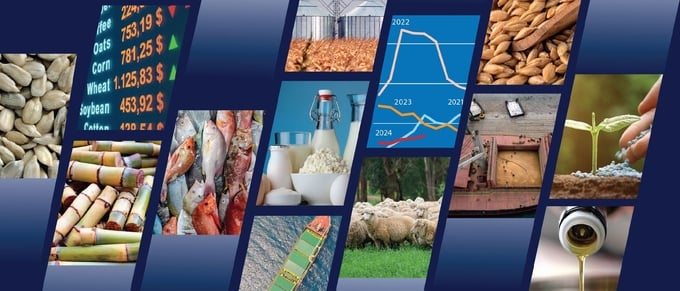May 31, 2025 | 05:59 GMT +7
May 31, 2025 | 05:59 GMT +7
Hotline: 0913.378.918
May 31, 2025 | 05:59 GMT +7
Hotline: 0913.378.918

The Food Outlook also includes a special chapter focusing on fertilizers, offering a comprehensive review of global fertilizer trade between 2021 and 2023 and a short-term market outlook for 2024/25.
Supplies of most of the world’s major food commodities are expected to be adequate in 2024/25, although extreme weather, rising geopolitical tensions, sudden policy changes and other factors could all potentially tip the delicate global demand-supply balances and impact prices and global food security, according to a new report from the Food and Agriculture Organization of the United Nations (FAO).
The latest FAO Food Outlook, a biannual publication, offers updated forecasts for the production, trade, utilization and stocks of major food staples.
On the production side, world outputs of rice and oilseeds are expected to be at record levels, while those of wheat and maize will likely decline modestly. The Food Outlook provides detailed market assessments for wheat, coarse grains, rice, oilcrops, sugar, meat, dairy products and fisheries.
The Food Outlook also provides FAO’s preliminary estimate for the global food import bill in 2024, forecast to rise by 2.5 percent to exceed $2 trillion. Those projections are driven by relatively favourable macroeconomic conditions, including steady global economic growth, and lower food commodity prices.
The new edition of the report has a special chapter on the dynamic effects of shocks to shipping costs on the food import bill – a topical variable given conflict-derived volatility on the Black Sea and Red Sea routes and due to drought impacts on the Panama Canal. The analysis shows that these shocks have a positive impact on the value of the FIB in the short term, with a larger effect on the group of net food-importing developing countries (NFIDCs).
The Food Outlook also includes a special chapter focusing on fertilizers, offering a comprehensive review of global fertilizer trade between 2021 and 2023 and a short-term market outlook for 2024/25.
The chapter tracks the series of shocks, including the war in Ukraine, that directly or indirectly had an impact on primary nutrients such as nitrogen, phosphorus and potassium. Soaring natural gas prices were a major catalyst, rendering fertilizer production uneconomic, while other factors, including shipping and insurance costs as well as trade measures, also drove world fertilizer prices higher.
The shocks led to a significant contraction in fertilizer trade in 2022 with a rebound in 2023 to similar levels of 2021.The article shows that in April 2024, fertilizer prices as presented by a basket of nitrogen, phosphorus and potassium prices, averaged $327 per tonne, compared to $815 in April 2022. With the decline in prices, fertilizer trade volumes have rebounded with Nitrogen trade close to its 2021 level.
Overall, the short-term outlook for fertilizers suggests stability over the next six months, according to FAO, with improved availability and affordability across the three main ingredients. Future shocks to global fertilizer markets are likely to be determined by developments in energy markets due to geopolitical or other causes.
(FAO)

(VAN) Vikas Rambal has quietly built a $5 billion business empire in manufacturing, property and solar, and catapulted onto the Rich List.

(VAN) Available cropland now at less than five percent, according to latest geospatial assessment from FAO and UNOSAT.

(VAN) Alt Carbon has raised $12 million in a seed round as it plans to scale its carbon dioxide removal work in the South Asian nation.

(VAN) Attempts to bring down the price of the Japanese staple have had little effect amid a cost-of-living crisis.

(VAN) Fourth most important food crop in peril as Latin America and Caribbean suffer from slow-onset climate disaster.

(VAN) Shifting market dynamics and the noise around new legislation has propelled Trouw Nutrition’s research around early life nutrition in poultry. Today, it continues to be a key area of research.

(VAN) India is concerned about its food security and the livelihoods of its farmers if more US food imports are allowed.